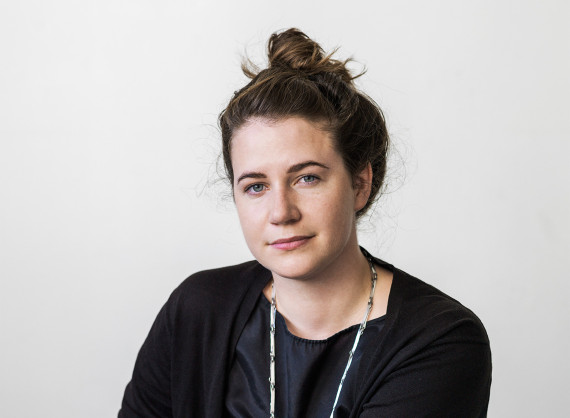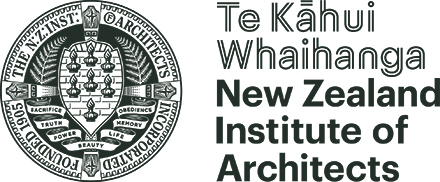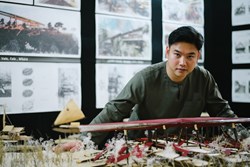Why architecture? Liz Tjahjana
Liz Tjahjana, an architect at Pac Studio.

Frances Cooper, architect, Athfield Architects
An architectural education is a robust base from which one can springboard into many facets of design. I've always felt it was a degree in problem solving, a skill that is invaluable in any profession.

Patrick Loo
Architecture is a part of everyone’s life. A career in architecture makes one a part of that life too.
Frances Cooper, architect, Athfield Architects

Patrick Loo

Architect Liz Tjahjana explains why she chose architecture.
Liz, would you mind giving us a little background to your architectural career so far. When did you first hear about architecture and think of doing it for a career?
I have always been drawn to the creative field though was quite studious at school and enjoyed a bit of textbook learning too – I think it was halfway through high school that I discovered that architecture was a profession that combined this creativity with the pragmatics.
Were you into making things or drawing things when you were you young?
Always, apparently! I remember creating my own books – writing and illustrating short stories and binding them together into a stapled stack. I never really drew buildings in particular – although I was really fascinated with making things with Lego and toy blocks.
Are you an arts or sciences person? Or both?
Probably more of an arts person – though I see the design process as a scientific one. You create multiple iterations of an idea with varying parameters in order to test out what the best solution would be, perhaps like a scientist’s collection of petri dishes!
At secondary school what subjects did you enjoy – did they feed into your later studies?
I enjoyed Art History, English Literature and Painting. It fostered a huge interest in architectural theory and history when I got to university. The writing and analytical skills gained was of help not only with essay writing tasks but in formulating/communicating thoughts and concepts.
What attributes should a good architect have?
Creativity and vision, and the passion to carry it through as it is often a long and hardly straightforward process. Good communication skills – visual, technical and verbal. Attention to details.
When you were at college, did you receive much info about architecture as a potential course of study?
Not particularly – I was aware of it as an option but never had a clear grasp of what the degree would entail. In hindsight the creative curriculum at school was quite different to what design studio at university was.
There are three schools of architecture in New Zealand – how did you decide which one to go to? Did you go to open days, or meet anyone from the university before you enrolled? Or did you already know where you wanted to go?
I wanted to stay in Auckland. I went to the UoA open day and found that they had great facilities. I also received a partial scholarship which helped my decision.
Was architecture school how you imagined it?
Not at all! The breadth of learning was incredible, from theoretical papers to very hands on furniture making courses. Also we quickly learned the ‘studio culture’ in which you’re encouraged to work in close proximity to and with your peers. You’re always in a creative environment and it’s great to be able to bounce ideas around. I especially enjoyed the self directed design research for our final year, there was a lot of flexibility in developing your own brief and output of your design research. I found there are a lot of avenues that architecture can be explored in.
How were your studies organised? Did you spend most of your time in a studio designing, or in lectures?
Studio was a huge part of our studies to the point where the lectures and written assignments came secondary to design!
Architecture schools can be known for quite heavy workloads. Did you find that?
It definitely is a degree which demands time and commitment. This is because a design project isn’t about quantitative checklists – design is an iterative process in which you continue to refine and develop your ideas.
Did your fellow architecture students go on to practice, or did some veer off into other fields?
We graduated in the midst of recession – while it took a while for a lot of us to get jobs most are in practice (though a lot are overseas) – some ended up in other creative fields or research, a small number has taken a 180 turn!
Where do you work now? And how did you end up there?
I am at Paterson Architecture Collective – I was introduced to Aaron while working as a tutor for a paper he lectured at the UoA.
Talk us through what you do day to day?
Because I’m at a small firm my role is quite varied in range and scale. I could be assisting with a concept design one day and drawing up technical details for documentation the next. Sometimes I would carry out site visits and other days researching materials or choosing colour finishes.
What do you like most about what you do now? Is the career you have how you imagined it would be?
I like the variety within my role and being able to learn about a project from inception to completion. Best part of the job (while also the most daunting) is being on site and seeing the lines you’ve put down on paper come to life! I think architecture as a career is quite different to my perception prior to starting. It is a very dynamic profession, there are a lot of consultant coordination and client relationships you need to build – design is only one aspect whilst there are a lot of factors and parameters governing the eventual outcome.



